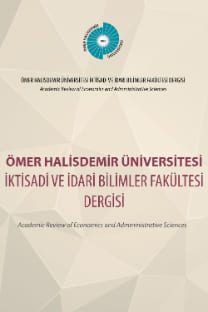Birleşmiş Milletler Güvenlik Konseyi'nin Reform Sorunsalı
Birleşmiş Milletler, Güvenlik Konseyi, reform, vestfalyan sistem
The Reform Problematiqe of the United Nations Security Council
United Nations, Security Council, Reform, Westphalian System,
___
- Assembly Debates, International Studies Quartely, 59.
- Bourantonis, D. (2005). The History and Politics of UN Security Council Reform, London: Routledge.
- Chayes, A. & Chayes, A. H. (1995), The New Sovereignty: Compliance with International Regulatory Agreements, Cambridge: Harvard University Press.
- Coicaud, J. M. & Heiskanen, V. (2001). The Legitimacy of International Organizations, Tokyo: United Nations Universityy Press.
- Çakmak, C. (2014). Birleşmiş Milletler Güvenlik Konseyi: Eleştirildiği Kadar Vazgeçilemeyen Bir Aktör, Doğan, N. v.d. (ed.), BM Sistemi ve BM’de Reform Tartışmaları, Ankara: Siyasal Kitabevi.
- Fitzgerald, A. (2000). Security Council Reform: Creating a More Representative Body of the Entire UN Membership, Peace International Review, 12 (2).
- General Assembly Report. (2004a). Report of the Open-ended Workin Group on the Question of Equitable Representation on and Icrease in the Membership of the Security Council and Other Matters related to the Security Council, https://digitallibrary.un.org/record/529659/files/A_58_47-EN.pdf (Erişim Tarihi: 10.01.2019).
- General Assembly Report. (2004b). Report of the High-Level Panel on Threats, Challenges and Change, http://hrlibrary.umn.edu/instree/report.pdf (Erişim Tarihi: 10.01.2019).
- General Assembly Report. (2005a). Question od Equitable Reoresentation on and Increase in the Memebership of the Security Council and Related Matters, https://www.globalpolicy.org/images/pdfs/0706g4resolution.pdf (Erişim Tarihi: 10.01.2019).
- General Assembly Report. (2005b). Question od Equitable Reoresentation on and Increase in the Memebership of the Security Council and Related Matters, https://www.globalpolicy.org/images/pdfs/0718auresolution.pdf (Erişim Tarihi: 10.01.2019).
- General Assembly Report. (2005c). Question od Equitable Reoresentation on and Increase in the Memebership of the Security Council and Related Matters, https://www.globalpolicy.org/images/pdfs/0721uforcresolution.pdf (Erişim Tarihi: 10.01.2019).
- General Assembly Report. (2005d). To all Permanent Representatives and Permanent Observesr of all Missions to the United Nations, https://www.globalpolicy.org/images/pdfs/Swiss_S5_Resolution_November_10_2005.pdf (Erişim Tarihi: 10.01.2019).
- Hurd, I. (2008a). After Anarchy: Legitimacy and Power in the United Nations Security Council, Princeton: Princeton University Press.
- Hurd, I. (2008b). Myths of Membership: The Politics of Legitimation in UN Security Council Reform, Global Governance, 14.
- Krisch, N. (2011). Informal Reform in the Security Council, Wilde, R. (ed.), United Nations Reform Through Practice: Report of the International Law Association Study Group on United Nations Reform, International Law Association United Nations Reform Study Group, https://www.peacepalacelibrary.nl/ebooks/files/SSRN-id1971008.pdf (Erişim Tarihi: 10.01.2019).
- Luck, E. C. (2005). How Not to Reform the United Nations, Global Governance, 11 (3).
- Report of the Facilitators. (2007). To the President of the General Assembly on the Consultations Regarding “The Question of Equitable Reprasentation on and Increase in the Membership of the Security Council and Other Matters Related to the Security Council”, http://www.un.org/ga/president/61/letters/SC-reform-Facil-report-20-April-07.pdf (Erişim Tarihi: 10.01.2019).
- Scharpf, F. W. (1999), Governing in Europe: Effective and Democratic?, Oxford: Oxford University Press.
- Teixeira, P. (2003). The Security Council at the Dwn of the Twenty-First Century: To What Extent is it Willing and able to Maintain International Peace and Security?, United Nations Institute for Disarmament Research, Geneva.
- Thakur, R. (2004). United Nations Security Council Reform, African Security Review, 13 (3).
- Tharoor, S. (2003). Why America Still Needs the United Nations, Foreign Affairs, 82 (5).
- UN Press Release. (1997). Assembly President Proposes Increase in security Council Memebership to 25 by Edding 5 Permanent, 4 non-Permanent Members, GA/9228, https://www.un.org/press/en/1997/19970320.ga9228.html (Erişim Tarihi: 10.01.2019).
- van Kesteren, K. (2005). Reforming the Security Council: Views from Practice, Blokker, N. & Schrijver, N. (ed.), The Security Council and the Use of Force: Theory and Reality-A Need for Change?, Boston: Martinus Nijhoff Publishers.
- Weiss, T. (2003). The Illusion of UN Security Council Reform, Washington Quartely, 26 (4).
- ISSN: 2564-6931
- Yayın Aralığı: Yılda 4 Sayı
- Başlangıç: 2008
- Yayıncı: NİĞDE ÖMER HALİSDEMİR ÜNİVERSİTESİ
Feyza Yıldız YURTAL, Adem AKBIYIK
Birleşmiş Milletler Güvenlik Konseyi'nin Reform Sorunsalı
Korku Endeksi, Hisse Senedi Piyasası ve Döviz Kuru İlişkisi: Türkiye İçin Ampirik Bir Analiz
Hakan SARITAŞ, Elif Hilal NAZLIOĞLU
Duygusal Zekanın Hizmet Odaklılık ve Algılanan Performans Açısından Değerlendirilmesi
Görkem AKGÜL, Tülay YENİÇERİ, Binnaz ÇİNAR
BMİDÇS’DEN PARİS ANLAŞMASI’NA: BİRLEŞMİŞ MİLLETLER’İN İKLİM DEĞİŞİKLİĞİYLE MÜCADELE ÇABALARI
0000-0003-3556-9216, Arzu ÖZTÜRK
BÖLGESELCİLİK KAVRAMI IŞIĞINDA KARADENİZ BÖLGESİ: SOĞUK SAVAŞ SONRASI DIŞ POLİTİKA DİNAMİKLERİ
Bölgeselcilik Kavramı Işığında Karadeniz Bölgesi: Soğuk Savaş Sonrası Dış Politika Dinamikleri
BİRLEŞMİŞ MİLLETLER GÜVENLİK KONSEYİ’NİN REFORM SORUNSALI
İşletmelerde Uzaktan Çalışanların Yönetilmesi: Lojistik Sektöründe Nitel Bir Alan Araştırması
